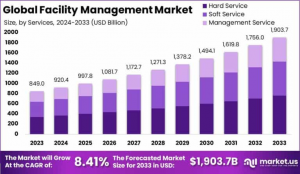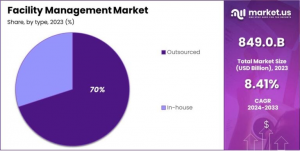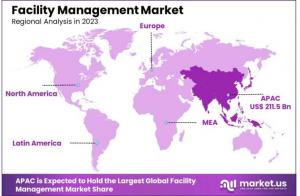The Facility Management Market is expected to grow from USD 920 bn in 2024 to USD 1,903.7 billion by 2033, with a strong 8.41% CAGR (2024-2033).
The Hard Services segment also held a leading position in the industry in 2023, accounting for more than 40% of the market share.
”
NEW YORK, NY, UNITED STATES, January 27, 2025 /EINPresswire.com/ -- According to Market.us’s latest study, Facility management (FM) is a professional field dedicated to ensuring that all aspects of a building's environment work harmoniously to support its occupants. This includes the physical maintenance and safety of buildings, but also extends to enhancing comfort, efficiency, and overall functionality through management of space, infrastructure, and organizational services. Facility managers play a pivotal role in integrating various functions - ranging from security to cleaning and maintenance, ensuring that both the facility and its services meet the needs of its users and support the core operations of an organization.— Tajammul Pangarkar
The facility management market is integral to modern organizational infrastructure, influencing numerous industries worldwide. The demand for facility management services is driven by the need for maintaining and securing complex building systems, accommodating technological advancements, and the increasing focus on energy efficiency and sustainability. The market trends indicate a rising adoption of smart technologies, which include real-time monitoring systems and IoT (Internet of Things) integrations that help in predictive maintenance and energy management. This tech-driven approach not only ensures operational efficiency but also boosts the longevity and sustainability of facility assets.
👉 𝐒𝐚𝐦𝐩𝐥𝐞 𝐑𝐞𝐩𝐨𝐫𝐭 𝐑𝐞𝐪𝐮𝐞𝐬𝐭: 𝐔𝐧𝐥𝐨𝐜𝐤 𝐕𝐚𝐥𝐮𝐚𝐛𝐥𝐞 𝐈𝐧𝐬𝐢𝐠𝐡𝐭𝐬 𝐟𝐨𝐫 𝐘𝐨𝐮𝐫 𝐁𝐮𝐬𝐢𝐧𝐞𝐬𝐬: https://market.us/report/facility-management-market/free-sample/
Key benefits for stakeholders in the facility management market include improved safety, enhanced operational efficiency, and cost reductions. Facility managers ensure compliance with health and safety regulations, which minimizes risks and protects organizations from potential liabilities. Additionally, strategic facility management can significantly enhance employee productivity and well-being by creating optimal working conditions, thus indirectly boosting the overall performance of an organization.
Moreover, the evolving nature of the workplace and environmental sustainability are central themes in the development of facility management strategies today. There's an increasing emphasis on creating adaptive, flexible work environments that cater to the needs of a diverse workforce, including the aging population and the gig economy. This adaptability not only supports the well-being of employees but also aligns with broader environmental goals by integrating green practices and technologies.
Facility Management Market Insights
➤The Global Facility Management Market is on a robust growth trajectory, projected to reach USD 1,903.7 billion by 2033, growing from USD 849.0 billion in 2023. This reflects a steady CAGR of 8.41% during the forecast period from 2024 to 2033.
➤In 2023, the outsourced segment emerged as a clear leader, capturing over 70% of the market share. Organizations increasingly rely on external expertise to optimize operations, driving this segment's dominance.
➤Among service types, hard services accounted for more than 40% of the market share in 2023. These include maintenance, HVAC systems, and electrical services, which remain critical for facility operations.
➤The commercial sector stood out as the top contributor, representing over 32% of the market share in 2023. The growing focus on corporate spaces, shopping complexes, and retail facilities has propelled this segment's growth.
➤In regional terms, Asia-Pacific led the global market, holding a commanding 32.6% share in 2023. The region’s revenues reached approximately USD 211.5 billion, driven by rapid urbanization and expanding infrastructure development.
👉 𝐁𝐮𝐲 𝐍𝐨𝐰 𝐭𝐡𝐢𝐬 𝐏𝐫𝐞𝐦𝐢𝐮𝐦 𝐑𝐞𝐩𝐨𝐫𝐭 𝐭𝐨 𝐆𝐫𝐨𝐰 𝐲𝐨𝐮𝐫 𝐁𝐮𝐬𝐢𝐧𝐞𝐬𝐬: https://market.us/purchase-report/?report_id=135368
Time to Invest
The Growing Potential in Facility Management
Facility managers in the U.S. earn between $31,330 and $134,570 annually, reflecting the wide range of opportunities in the industry. Encouragingly, 81% of property managers reported revenue growth over the past two years, with 88% expecting further growth in the next two years. This optimism highlights a thriving sector focused on efficiency, with 45.1% of facility managers prioritizing operational improvements.
Technology Driving Savings and Efficiency
Smart technologies and data analytics are transforming facility management. Energy costs can be reduced by up to 20% using sensor technologies, while productivity sees a similar boost of 20% with data-driven tools. Despite the global market for facility management software reaching $4 billion, 80% of users aren’t fully leveraging their software’s potential, pointing to significant opportunities for optimization.
Automation and Innovation Leading the Way
Workloads are increasing, with 55.7% of facility managers expecting more work orders in 2024, yet 44.1% find tracking them time-consuming. To address this, facilities are turning to automation - 27.4% believe work order management software will reduce repetitive tasks. Innovations like augmented reality are gaining traction, with 26% of manufacturing facilities already using AR to improve efficiency, signaling a shift toward smarter, tech-driven solutions.
Analysts’ Viewpoint regarding Facility Management Market
In the rapidly evolving field of facility management, the convergence of sustainability, advanced technology, and changing regulatory environments presents both significant opportunities and challenges for investment. The growth is primarily driven by the increased adoption of smart technologies and a heightened focus on sustainability practices aimed at reducing carbon footprints and enhancing energy efficiency.
Investment opportunities are particularly robust in areas involving smart building technologies, including IoT and AI-driven maintenance systems. These technologies not only enhance operational efficiency but also improve building safety and occupant comfort, making investments in these areas particularly attractive. However, investors must navigate the risks associated with the rapid pace of technological change and the substantial initial costs involved in implementing these advanced systems.
The regulatory environment is also a crucial factor for facility managers and investors alike. With a growing emphasis on sustainability, facilities management is increasingly subject to environmental regulations. For example, new standards and laws are being set to lower emissions and increase the energy efficiency of buildings. Compliance with these regulations not only mitigates legal risks but can also enhance the marketability of properties in a world where green credentials are increasingly valued by tenants and investors.
👉 𝐃𝐨𝐧'𝐭 𝐦𝐢𝐬𝐬 𝐨𝐮𝐭 𝐨𝐧 𝐛𝐮𝐬𝐢𝐧𝐞𝐬𝐬 𝐨𝐩𝐩𝐨𝐫𝐭𝐮𝐧𝐢𝐭𝐢𝐞𝐬 | 𝐆𝐞𝐭 𝐬𝐚𝐦𝐩𝐥𝐞 𝐩𝐚𝐠𝐞𝐬 𝐚𝐭: https://market.us/report/facility-management-market/request-sample/
Impact of AI on Facility Management Market
The impact of Artificial Intelligence (AI) on the facility management market is profound and multifaceted, driving efficiencies and innovation across various aspects of operations. AI technologies are reshaping the landscape by enabling smarter, more responsive building management systems, leading to significant cost savings, enhanced safety, and improved environmental sustainability.
Operational Efficiency: AI in facility management primarily boosts operational efficiencies through predictive maintenance. This technology predicts equipment failures before they occur, allowing for timely maintenance that avoids costly downtime and extends the lifespan of building systems. Facilities equipped with AI can optimize energy usage, regulate building temperatures, and manage lighting and security systems more effectively, thereby reducing overall operational costs.
Data Utilization and Decision Making: AI systems integrate with Internet of Things (IoT) devices to collect and analyze vast amounts of data from building operations. This data-driven approach enables facility managers to make informed decisions that enhance occupant comfort and operational efficiency. Real-time data analysis helps in space utilization, energy management, and can even dictate the need for building repairs and upgrades.
Sustainability and Compliance: AI contributes significantly to the sustainability goals of facility management by optimizing resource use and reducing waste. It supports compliance with increasingly stringent environmental regulations by monitoring and reporting on energy consumption and carbon emissions. This not only helps facilities meet legal standards but also aligns with broader corporate social responsibility goals regarding environmental impact.
Security and Risk Management: Enhanced security is another critical benefit of AI in facility management. AI-driven systems can monitor and analyze video feeds for unusual activities, control access to buildings, and manage fire and safety systems more effectively. These capabilities are crucial for preventing unauthorized access and ensuring the safety of occupants and assets in real time.
👉 𝐁𝐮𝐢𝐥𝐝 𝐚 𝐅𝐮𝐭𝐮𝐫𝐞 - 𝐩𝐫𝐨𝐨𝐟 𝐁𝐮𝐬𝐢𝐧𝐞𝐬𝐬! 𝐁𝐮𝐲 𝐨𝐮𝐫 𝐏𝐫𝐞𝐦𝐢𝐮𝐦 𝐈𝐧𝐬𝐢𝐠𝐡𝐭𝐬 𝐚𝐭 𝐀𝐟𝐟𝐨𝐫𝐝𝐚𝐛𝐥𝐞 𝐏𝐫𝐢𝐜𝐞𝐬 𝐍𝐨𝐰: https://market.us/purchase-report/?report_id=135368
Report Sementation
Type Analysis
The Outsourced segment of the facility management market proved to be particularly robust, capturing a substantial 70% of the market share. This dominance indicates a strong preference among businesses to leverage external expertise rather than developing in-house capabilities. Companies are increasingly recognizing the benefits of outsourcing, such as cost efficiency, access to specialized skills, and improved focus on core business activities. This trend is supported by a growing trust in the expertise of facility management service providers who offer comprehensive solutions that cover everything from maintenance and security to cleaning services, ensuring operational efficiency across various industries.
Service Analysis
Turning to the specifics of the services offered within the facility management sector, the Hard Services segment commanded a noteworthy 40% market share in 2023. Hard services, which include essential building maintenance like electrical, plumbing, and HVAC systems, are critical for the long-term functionality and safety of facilities.
The prominence of this segment reflects the increasing complexity of modern building systems and the crucial need for specialized maintenance that ensures they operate effectively. As buildings become more integrated with technology, the demand for skilled professionals capable of managing these complex systems efficiently is expected to rise, further cementing the importance of hard services in the facility management industry.
Application Analysis
Focusing on the application areas, the Commercial segment emerged as a dominant force, securing over 32% of the market share within the Facility Management Market. Commercial facilities, which include office buildings, shopping centers, and entertainment complexes, require meticulous management to ensure smooth operations and safety for occupants and visitors.
The significant share captured by this segment underscores the critical need for comprehensive facility management solutions that can address the unique challenges of commercial environments. These solutions not only enhance the functionality and aesthetics of commercial spaces but also contribute to sustainability and energy efficiency, which are increasingly important considerations for businesses worldwide.
👉 𝐃𝐨𝐰𝐧𝐥𝐨𝐚𝐝 𝐄𝐱𝐜𝐥𝐮𝐬𝐢𝐯𝐞 𝐒𝐚𝐦𝐩𝐥𝐞 𝐨𝐟 𝐭𝐡𝐢𝐬 𝐏𝐫𝐞𝐦𝐢𝐮𝐦 𝐑𝐞𝐩𝐨𝐫𝐭@ https://market.us/report/facility-management-market/free-sample/
Facility Management Market Analysis: Drivers, Restraints, Opportunities, and Challenges
Driver: Technological Integration
The integration of advanced technologies like IoT and data analytics is a significant driver in the facility management sector. As buildings and corporate environments become more complex, the need for efficient operation escalates. Technologies such as IoT facilitate real-time monitoring and management of facilities, enhancing operational efficiency and reducing costs. These technologies help in predictive maintenance, energy management, and ensuring the sustainability of operations, thereby driving the growth of facility management services.
Restraint: Labor Shortages
One of the primary restraints in the facility management industry is the ongoing labor shortage. This challenge is compounded by the aging workforce and the increasing skill gaps in the sector. Facilities management teams are finding it difficult to source skilled labor, which is essential for maintaining the quality and reliability of services. This shortage is pushing up labor costs and forcing companies to invest more in training and technology as stop-gap solutions to address the deficit in human resources.
Opportunity: Sustainability and ESG Initiatives
Sustainability and environmental, social, and governance (ESG) initiatives present significant opportunities for growth in the facility management sector. There is a growing demand from consumers and regulatory bodies for businesses to reduce their carbon footprint and enhance energy efficiency. Facility management services that can integrate sustainability into their operations, such as through energy-efficient systems and waste reduction practices, not only comply with regulatory demands but also attract clients looking to enhance their own sustainability efforts.
Challenge: Economic Uncertainty
The facility management industry faces the challenge of economic uncertainty, including potential recessions and fluctuating budgets. Facility managers are required to do more with less, managing increasing workloads with fewer resources. Economic pressures force facility managers to justify expenditures and optimize operations without compromising service quality. This requires innovative approaches to budget management, cost control, and resource allocation to ensure operational resilience and continuity in uncertain times.
Key Updates
April 2024: SmartCheck, a SaaS-based facility management provider, secured undisclosed debt funding from Incred Capital. Facilitated by Lakhani Financial Services, this funding positions SmartCheck to scale operations and drive innovation in the fast-growing facility management sector.
February 2024: CBRE Group Inc. announced plans to acquire J&J Worldwide Services, a provider of engineering, base support, and facility maintenance services for the U.S. Federal government. This strategic acquisition, backed by Arlington Capital Partners, strengthens CBRE’s footprint in government-related facility management.
December 2023: Compass Group India, a part of the British multinational Compass Group PLC, revealed plans to scale its facility management portfolio from 2 million sq. ft to 10 million sq. ft. This expansion is driven by a rise in office leasing as employees return to physical workplaces.
March 2023: ISS secured a five-year contract to deliver integrated facility services (IFS) to a U.S.-based pharmaceutical giant with a global presence. This deal underscores ISS’s growing focus on partnerships in life sciences.
Top Key Players in the Market
CBRE Group Inc.
Jones Lang LaSalle Incorporated
Cushman & Wakefield PLC
Emeric Facility Services
SMI Facility Services
Sodexo Inc.
AHI Facility Services Inc.
ISS Facility Services Inc.
Shine Management & Facility Services
Guardian Service Industries Inc.
Other Key Players
𝐆𝐚𝐢𝐧 𝐌𝐨𝐫𝐞 𝐈𝐧𝐬𝐢𝐠𝐡𝐭𝐬
Airline Industry Market- https://market.us/report/airline-industry-market/
DAO-as-a-Service (DAOaaS) Market- https://market.us/report/dao-as-a-service-daoaas-market/
AI In Digital Transformation Market- https://market.us/report/ai-in-digital-transformation-market/
Enterprise Data Management Market- https://market.us/report/enterprise-data-management-market/
Open Banking Market- https://market.us/report/open-banking-market/
Network Security Market- https://market.us/report/network-security-market/
K-12 Testing and Assessment Market- https://market.us/report/k-12-testing-and-assessment-market/
Applied AI Market- https://market.us/report/applied-ai-market/
Generative AI in Real Estate Market- https://market.us/report/generative-ai-in-real-estate-market/
Generative AI in Customer Service Market- https://market.us/report/generative-ai-in-customer-service-market/
Applicant Tracking System Market- https://market.us/report/applicant-tracking-system-market/
AI-Powered Design Tools Market- https://market.us/report/ai-powered-design-tools-market/
Smart Manufacturing Market- https://market.us/report/smart-manufacturing-market/
Lawrence John
Prudour
+91 91308 55334
Lawrence@prudour.com
Visit us on social media:
Facebook
LinkedIn
Legal Disclaimer:
EIN Presswire provides this news content "as is" without warranty of any kind. We do not accept any responsibility or liability for the accuracy, content, images, videos, licenses, completeness, legality, or reliability of the information contained in this article. If you have any complaints or copyright issues related to this article, kindly contact the author above.




